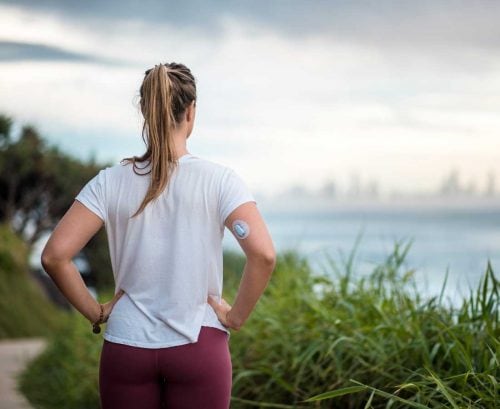
For the millions of people with diabetes – both types 1 and 2 – living with the condition can be challenging enough. And now COVID-19 has added extra challenges, with diabetes near the top of the list of pre-existing conditions that make complications from the novel virus more likely. Food and health writer and speaker Niki Bezzant looks at six ways to lower your COVID-19 risk if you have diabetes.
While the world is grappling with the coronavirus new pandemic, for some it might be easy to forget the one that was already happening before COVID-19 changed our lives, ie, diabetes. But, if you’re one of the people affected by the diabetes pandemic, it’s vital to take sensible steps to protect yourself from both health threats.
Can diabetes make it more likely to catch coronavirus?
In some parts of the world, 20 to 50 per cent of COVID-19 patients had diabetes, according to a recent report published in the Lancet. And while there’s no evidence, yet, that having diabetes is a risk factor for contracting the virus, experts agree it seems highly likely, since diabetes increases the risk of many infections.
This is potentially frightening information for people with diabetes. But there are steps you can take to protect yourself. Here are some recommendations from global diabetes experts.
Get the basics right
Make sure you’re vigilant about the basics of virus protection:
• Frequently clean your hands with soap and water or alcohol-based sanitiser
• Avoid touching surfaces others have touched
• Get into the habit of not touching your face
• Practice social distancing— stay 2 metres (6 feet) away from other people in public
• Consider wearing a mask in indoor public places
• Stay away from anyone who has a fever and/or cough.
Make sure your diabetes is well controlled
Having your blood glucose levels under control and keeping up with medication, if you take any, is always good practice, and even more important now.
Make sure you keep regular appointments (in person or online) with your diabetes nurse or doctor, and keep a good track of your blood glucose.
It may be useful to test more often than usual, in case your body is reacting differently under different or stressful conditions.
Keep good stocks of essential diabetes supplies on hand.
Keep your baseline health as good as possible
As always, you’ll be better able to fend off viruses if your immune system is as strong as it can be.
That means looking after yourself: get enough sleep; find ways to manage stress; stop smoking or vaping.
Exercising safely and regularly will help, too, for both mental and physical health.
Consider a flu shot; this won’t protect against COVID-19 but it will against the seasonal flu strains that can also make us really unwell.
A pneumococcal vaccine may also be recommended as people with diabetes may be more susceptible to pneumonia, which can be a serious complication of COVID-19.
Eat well
It’s tempting to relax and treat yourself with indulgent foods, especially after a long period of isolation.
Treats are fine, occasionally, but eating healthily most of the time will make a big difference to how you feel and how well you manage your diabetes.
Remember the basics here, too: lots of fresh, whole foods; colourful vegetables and fruit; nuts and seeds; legumes; whole grains; and a variety of protein foods.
Maintaining a healthy weight protects against COVID complications
There’s a strong link between obesity and poor outcomes from COVID-19, too, and type 2 diabetes and obesity may go hand in hand.
If you’re overweight or obese, losing even a small amount of weight can make a positive difference to your overall health and the management of your condition. If it’s practical, consider ways you might do this.
If you get sick, get seen early
If you feel unwell with any of the symptoms of COVID-19 or other respiratory symptoms – fever, cough, sore throat, shortness of breath – get checked out straight away.
Be prepared to advocate for yourself; make sure health care providers know about your diabetes and keep up with your diabetes medication even if you’re sick.
Don’t worry too much about COVID-19
It’s easy to get stressed about potential dangers, especially if you’re in a vulnerable group.
While it may be difficult, try not to get too stressed about the COVID situation.
Being proactive about keeping yourself safe and working on your health will help you feel empowered and not helpless in the face of two pandemics colliding.
Article sources and references
- Prof Stefan R Bornstein, MD et al. 2020. Practical recommendations for the management of diabetes in patients with COVID-19. Lancet. 8(6): 546-50.https://www.thelancet.com/journals/landia/article/PIIS2213-8587(20)30152-2/fulltext
- Kirsten J Coppell et al. 2020. Diabetes and COVID-19—the meeting of two pandemics: what are the concerns? NZMA. 33(1514)https://www.nzma.org.nz/journal-articles/diabetes-and-covid-19-the-meeting-of-two-pandemics-what-are-the-concerns
- Beyond Type 1. England's NHS releases study on risk of COVID-19 for people with diabetes. Accessed June 2020https://beyondtype1.org/risk-covid-diabetes/
- Coronavirus + diabetes. Accessed June 2020https://coronavirusdiabetes.org/
www.healthyfood.com










